Brave is a web browser that blocks ads by default. Created by Brendan Eich (who invented Javascript and co-founded Mozilla), the browser has 3M+ users and a cryptocurrency called Basic Attention Token (BAT) that aims to reinvent online advertising.
Overview
- What is Brave?
- Big Picture
- Features
- Speed
- Privacy and Security
- Traction
- Culture
- Drawbacks
- What is Basic Attention Token?
- Background + Problem
- The Solution: BAT
- Explainer Video
- Risks
- Thoughts and Notes
- Download Brave
- How to Buy BAT
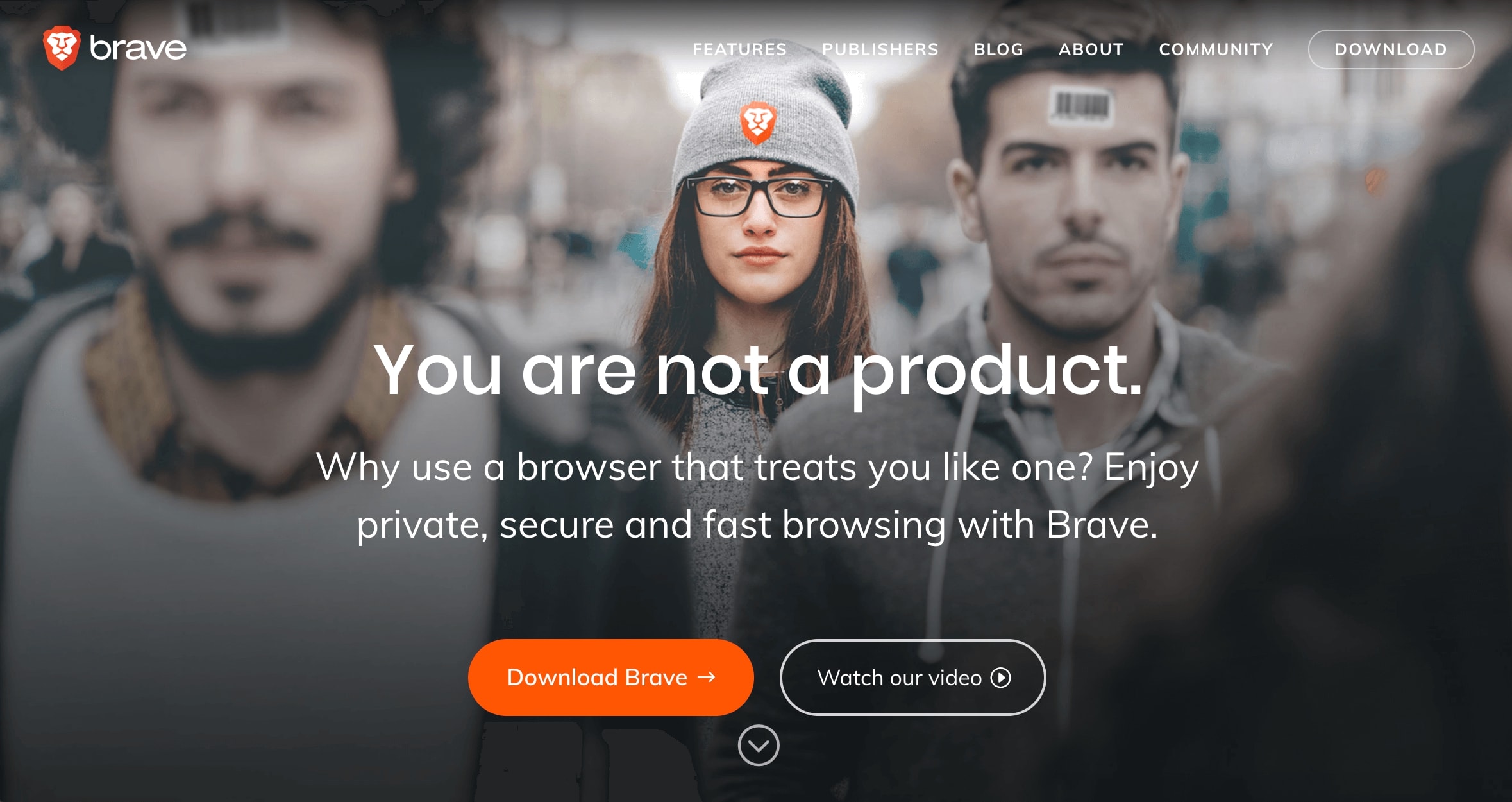
What is Brave?
Big Picture
Brave is a web browser that blocks ads and trackers by default. This makes the browser more private, more secure, and faster. It was founded by Brendan Eich, who both invented Javascript (popular programming language) and co-founded Mozilla (which makes the Firefox browser). Brave has over 3 million users, is growing fast, and seems to genuinely care about its users.
Features
Speed
- Brave is noticeably faster than other browsers (turns out, not loading ads and trackers saves time).

- In my opinion, this is the main feature.
- Speed saves time now. While privacy and security are indispensable, they save time later (and aren’t as obvious as speed).
- I've used Brave for a month, and have already saved about 17 minutes of loading time (estimated by the browser).
- Brave isn’t perfect, but it’s hard to switch back after trying.
- I now use it for about 90% of my browsing (the other 10% spent on Chrome—more on this in "drawbacks").
- For a more detailed comparison of Brave and Chrome, check out: Brave vs. Chrome: Which Browser is Better?
Privacy and Security
- Local data storage
- Brave servers do not store your browsing data. It’s stored on your device, which means you can delete it any time.
- Auto-HTTPS
- Website connections are automatically encrypted when possible.
- Unlike other browsers, this doesn’t require a separate extension like HTTPS Everywhere.
- Private tabs more private
- On most browsers, private browsing prevents people on your device from viewing your data, but still allows external tracking.
- On Brave, these trackers are blocked by default.
- Note: Brave uses private tabs instead of private windows, which can be a bit confusing.
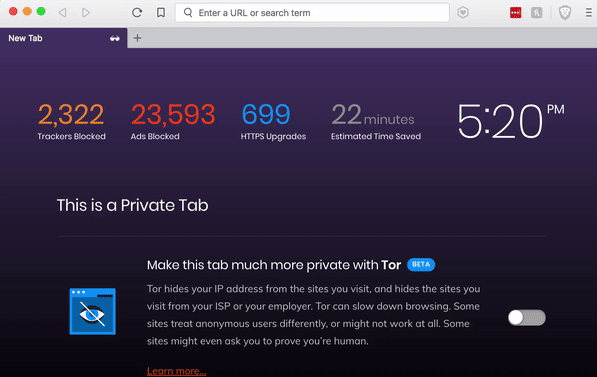
- Private tabs with Tor
- Brave is the first all-purpose browser to integrate Tor technology.
- As shown above, Tor is more private, but can interfere with your browsing experience.
- Note: this feature is still in beta.
- New session tabs
- Example:
- I have 2 Reddit accounts, and want to access both (without logging out of one to log in to the other).
- I would open a new session tab and log in to the second account (while still accessing the first account in the original tab).
- Example:

- Built-in password managers
- Brave automatically integrates popular password managers like LastPass, 1Password, bitwarden, and Dashlane.

- Using a password manager vastly improves account security. It's good practice to have this built-in.
- Brave automatically integrates popular password managers like LastPass, 1Password, bitwarden, and Dashlane.
Traction
- Launched in January 2016.
- In July 2018, Brave passed 3 million monthly active users.
- Even more impressively, they only passed 1 million users in December 2017, meaning their base tripled in about half the year.
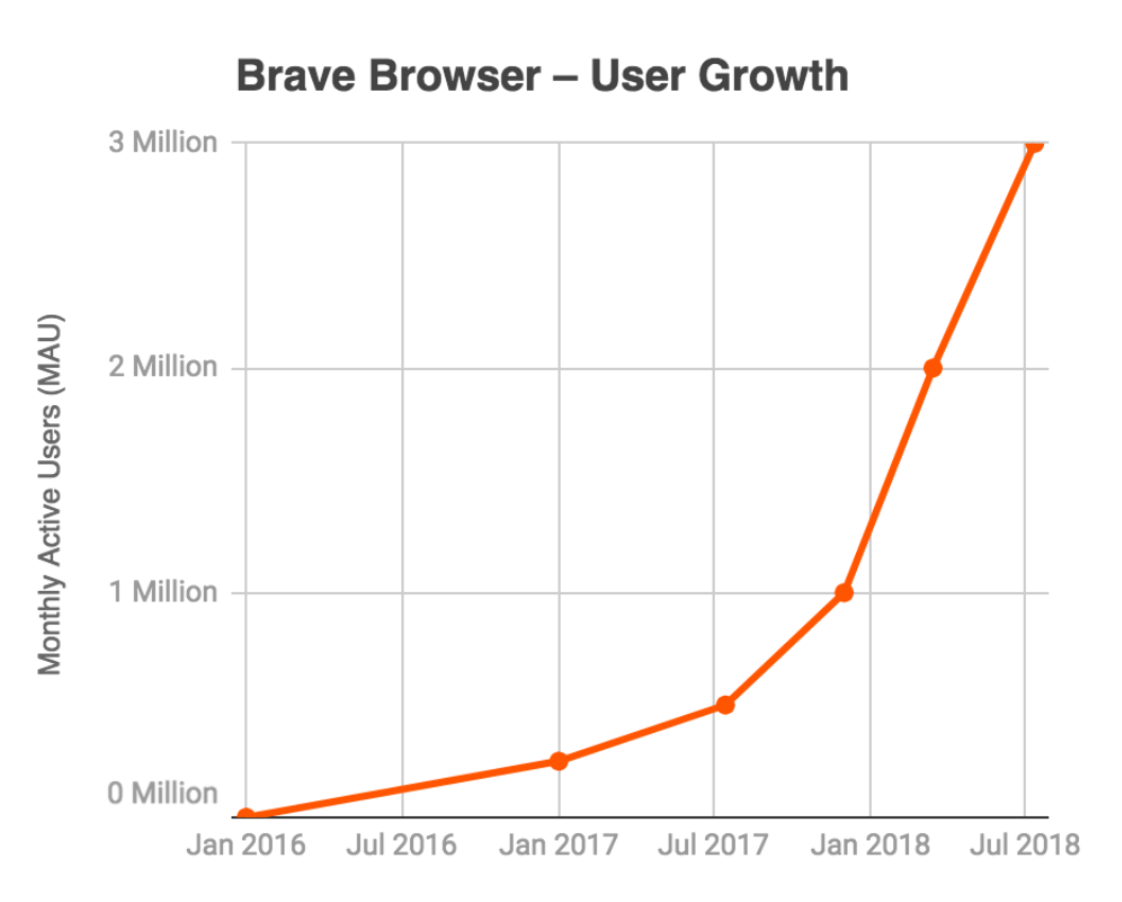
- Even more impressively, they only passed 1 million users in December 2017, meaning their base tripled in about half the year.
- Author and thought leader Tim Ferriss recently wrote a positive review of Brave in his weekly email "Five-Bullet Friday" on June 15, 2018.
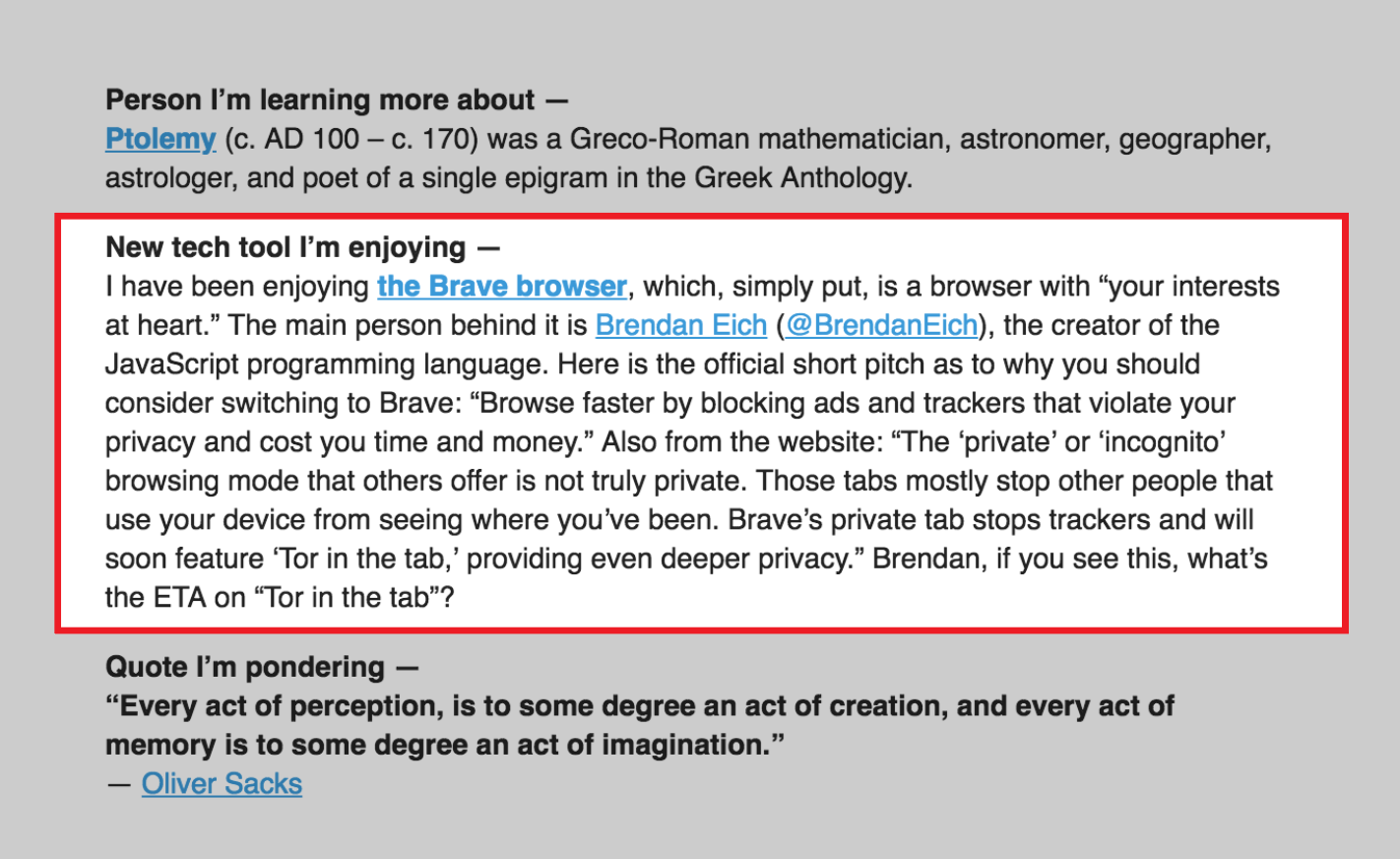
- On July 13, 2018, Cryptocurrency exchange Coinbase announced it’s exploring the addition of Basic Attention Token to its platform.
- If this happens, it would generate more awareness for Brave and BAT.
- Coinbase said the addition isn't definite (depending on the specific technology and local laws).
- While we can’t be sure, I’d imagine local laws are more likely to affect an anonymous cryptocurrency like Zcash (which is also being considered).
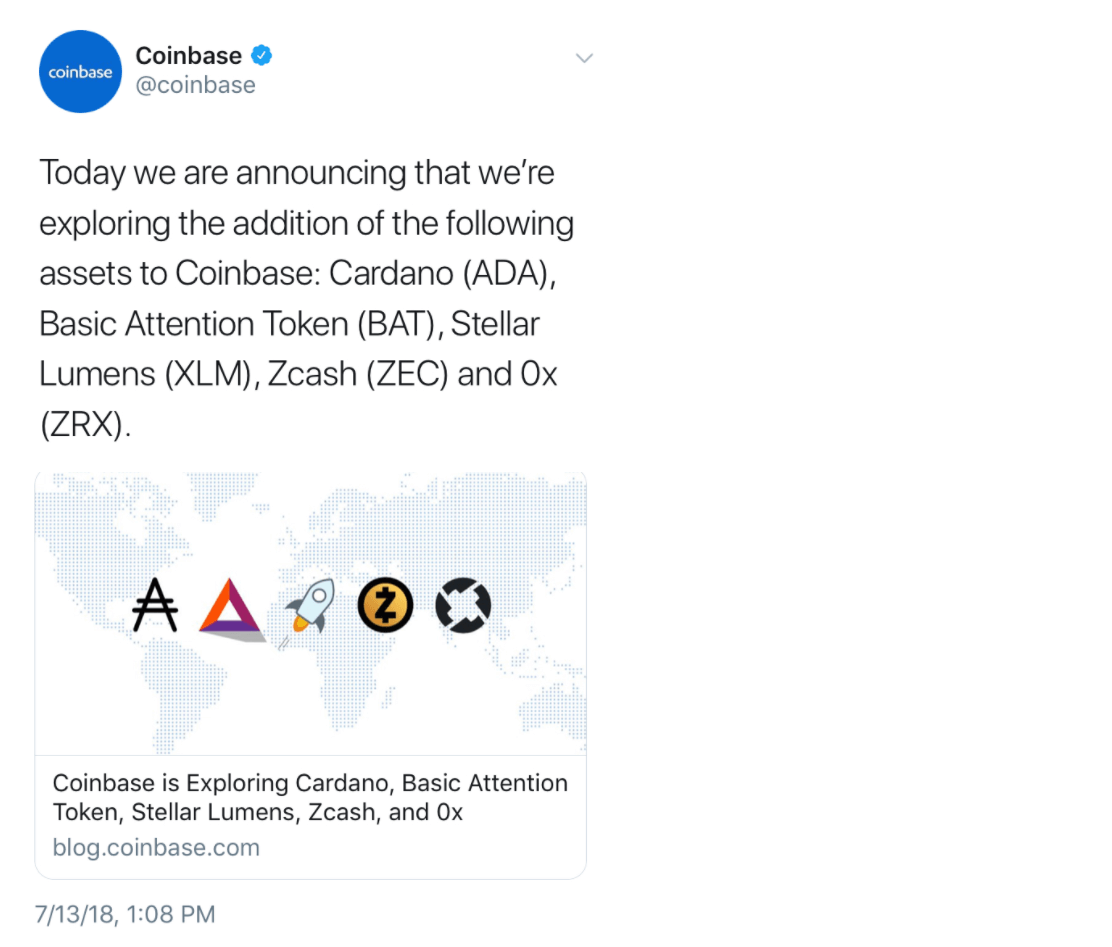
Culture
- Brave seems to genuinely care about its users.
- If successful, they could redefine what's expected of a web browser.
- From the jobs section of Brave’s website: "If your passion is fighting for users, questioning the status quo, and working with a big-brain, high-energy team, then join us. It’s time to fix the web together."
Drawbacks
- Sometimes, Brave blocks part of a website that you wanted.
- When this happens, it’s confusing to toggle with the settings and easier to use another browser.
- I asked several friends to try Brave, and this was the most-common complaint.
- That said, each friend continues to use Brave despite this.
For multi-step tasks (booking a flight, buying concert tickets, etc), I still use Chrome to make sure everything runs smoothly.Sometimes, I need a browser extension that Brave doesn't offer. Brave plans to support all Chrome extensions soon, so this issue will likely be temporary.- UPDATED (12/3/2018): With Brave's latest update, it now supports all Chrome extensions and runs much more smoothly. I now use it for nearly all of my browsing.

What is Basic Attention Token?
Background + Problem
-
Attention is the most prized asset on the Internet.
-
I've never never paid to search Google, yet Google makes money when I do.
-
How? Instead of asking for my money, they ask for my attention.
-
Then, Google sells my attention to the highest bidder.
- Fun example: Let’s say you Google "car insurance" and click the first ad.
- The car insurance company paid between $20 and $85 for that one click.
- So while you might not pay even $1 for this search, Google converted your attention to over $20

-
-
Even though the attention economy is booming, it is dominated by Facebook and Google.
- According to Brave, Facebook and Google currently pocket 73% of all digital advertising.
-
From another angle: Online publishers attract tons of valuable attention (especially on social media), but struggle to convert this attention into ad revenue.
The Solution: BAT
- In short, Basic Attention Token allows Brave users to "pay" attention.
- Like an idea Kevin Kelly once wrote: "where attention flows, money follows."
- Reworded for Brave: "where attention flows, BAT follows."
- Example:
- I use Brave.
- I read articles on MarkManson.net.
- Even if I don’t buy anything, Mark Manson automatically receives BAT (redeemable for USD) because I paid attention.
- "Well if the browser is free, then where does the money come from?" Mainly advertisers.
- Brave will launch a decentralized ad exchange, where Brave users can opt-in to see ads in exchange for BAT.
- The idea is to make Brave free and let advertisers fund the system.
- This will be highly private, yet highly targeted.
- The targeting is done anonymously (via machine learning and zero knowledge proofs), so Brave cannot access a user’s information or browsing data.
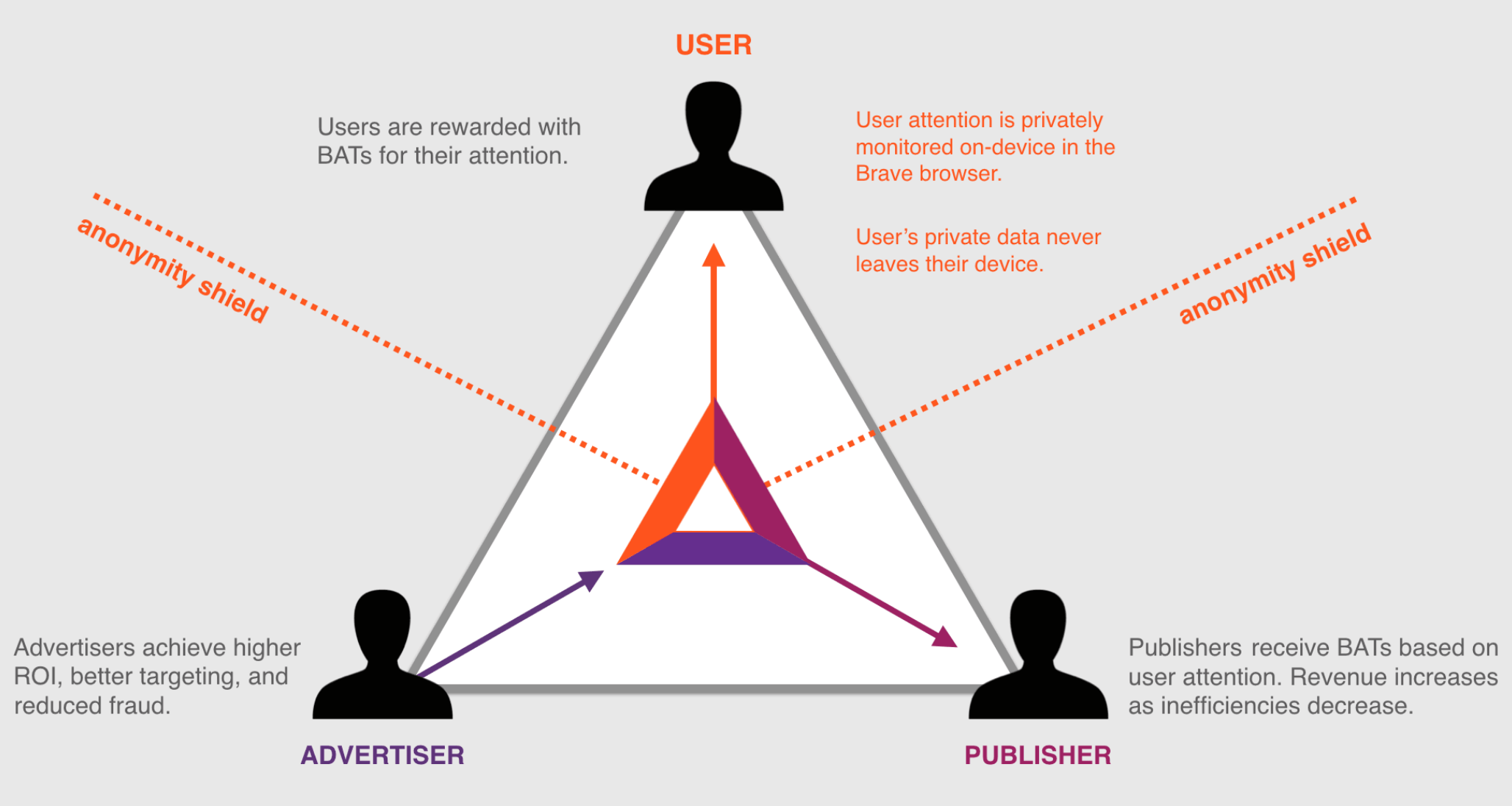
- The very unique part is this: Brave will only take 15% of all ad revenue (unlike Facebook and Google, which take 100%).
- The remaining 85% is split as follows:
- 70% to publishers
- Split based on how much attention each publisher gets.
- Similar to Spotify’s business model, which pays artists based on their number of plays.
- 15% to users
- Cha-ching! While this won’t be directly redeemable for cash, it will be used to fund your favorite publishers and access premium content that’s normally behind a paywall.
- "But will users really opt-in for ads?" I think a lot will. Since the entire ecosystem relies on users opting in, both Brave and publishers are highly incentivized to offer appealing rewards for BAT. Plus, ads are less creepy when the ad network and advertisers can't access your data.
- Note: The above percentages only apply for website ads. When ads appears directly in Brave (ex: in a new tab), users receive 70% of revenue.
- 70% to publishers
- The remaining 85% is split as follows:
- If Facebook and Google are the current "attention middlemen" of the Internet, Brave aims to be a new middleman that’s more fair and more efficient.
- From the Basic Attention Token white paper:
Google is at the center of the existing digital advertising ecosystem. They benefit from the complexity and opaqueness that defines it. BAT intends to empower the very users and publishers that are receiving less than they should. Google does not have a Blockchain-based tokenized system of offering rewards. Users are often unaware of how their privacy is compromised using Google.
Explainer Video
Risks
- According to Brave CEO Brendan Eich, the company’s biggest hurdle is “getting to the scale where we prove the private ad model.” (source: Reddit AMA – 8/16/2018)
- This makes sense—Brave’s ad model is still new, different, and unproven.
- According to Eich, Brave can prove this ad model after about 7 million people opt-in for its ad platform.

Thoughts
- Nowadays, speed of browser = speed of thought.
- Speed, privacy, and security may be the 3 most important aspects of an Internet browser. Brave seems to be the best option for all of them.
- Built by the inventor of Javascript and co-founder of Mozilla—wow.
- Downloading a new browser is like spring cleaning. You won't keep every bookmark and setting, but you’ll likely be better off anyway.
- Saves money on mobile data plan by not loading trackers and ads - up to $23/month (according to Brave).
- "Time without attention is worthless, so value attention over time." —Tim Ferriss
Thanks for reading!
Appreciate you reading! Feel free to reach out on Twitter with any thoughts @sam_feldman_
If you enjoyed the article, please share! For easy sharing, the URL bat.guide redirects to this page.
Best of luck in all your cryptocurrency pursuits!